28 Nov 2018 | Academic Freedom, Academic Freedom Reports, News and features, Press Releases
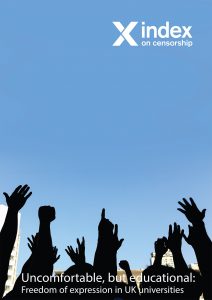
The full report can be read here.
A narrative of safety and risk is hampering freedom of speech on UK university campuses, a new report has found.
‘Uncomfortable but educational‘ — a short report and guide on the laws protecting free speech in universities by freedom of expression campaigners Index on Censorship — calls for more to be done to create an environment in which free speech is promoted as an equal good with other statutory duties. It also identifies Prevent as a key issue.
The report argues that universities should strengthen and simplify codes of practice to clarify their responsibilities and commitment to protecting free speech on campus. It also urges student unions to reaffirm a commitment to freedom of expression in their policies and remove “no-platforming” guidelines that involve outlawing speakers who are not members of groups already proscribed by government.
The report identifies the implementation of Prevent — which places obligations on universities to stop students being drawn into terrorism — as having a pernicious effect on freedom of expression and academic freedom in higher education and calls for an immediate independent review of the policy.
Despite near-daily news stories about attempts to shut down free speech on campus, the report finds that the environment for freedom of expression is poorly understood. Incidents are often misreported, while others — especially levels of self-censorship — are not reported publicly at all. A better understanding of the levels of explicit and implicit censorship on campus, coupled with the development of strategies for the better promotion of freedom of expression and at pre-university level are identified as crucial for ensuring free speech is protected.
The report draws on interviews and research of the sector over the past three years and in particular offers a guide to the legal protections and duties related to freedom of expression. It finds that often duties and rights such as those related to safety are presented as trumping those related to free speech, creating a risk-averse culture in which free speech is seen as a less important right.
“Protecting and promoting freedom of expression should be at the heart of what a university does – not an afterthought,” said Index on Censorship chief executive Jodie Ginsberg. “We want to encourage everyone to consider this as a core value – rather than one that is secondary to other rights and responsibilities.”
For more information or to arrange an interview, please contact Jodie Ginsberg at [email protected] or 020 7963 7260.
23 Nov 2018 | Campaigns -- Featured, Statements
[vc_row][vc_column][vc_column_text]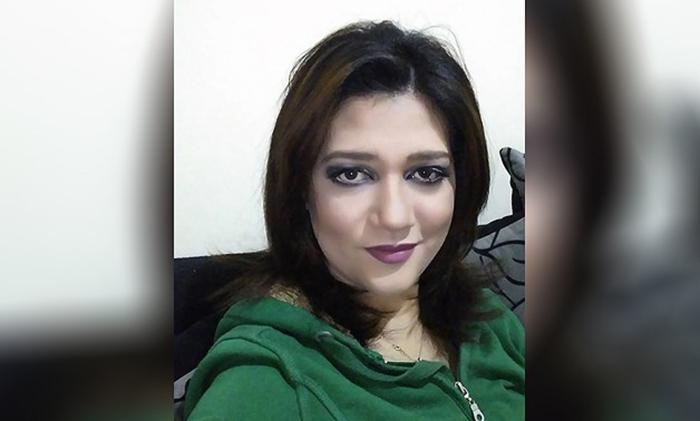
Index on Censorship and international human rights lawyers at Doughty Street Chambers condemn the continued detention of Amal Fathy – an Egyptian activist who made a video about her experience of sexual harassment.
Fathy was arrested on 9 May 2018 and has spent 200 days in detention on charges of “spreading fake news”. On 29 September she was given a suspended sentence of two years in prison on these charges with a £430 fine. Although Fathy was granted release on bail she remains in detention over further charges of “belonging to a terrorist group”, “using a website to promote ideas calling for terrorist acts”, and “intentionally disseminating false news that could harm public security and interest”.
She will appear in court on these charges on Sunday 25 November 2018.
“It is appalling that Amal Fathy remains in detention. Her ‘crime’ has been to speak out publicly about the sexual abuse faced by so many women in Egypt and she should be released immediately,” said Index on Censorship CEO Jodie Ginsberg.
Caoilfhionn Gallagher QC of Doughty Street Chambers said: “Amal Fathy has now been detained arbitrarily for 200 days, in unsanitary and unsafe conditions, without meaningful access to her lawyers, and away from her family and young son. She spoke out about the rights of women; now the Egyptian authorities are silencing her by holding her in prison for months on end, with no proper legal basis. The international community must now condemn Egypt’s flagrant breaches of her basic rights to liberty, due process and dignity.”
Fathy was initially arrested with her husband Mohamed Lotfy, and their two-year-old son. Their Cairo apartment was raided and searched. Lotfy, who leads the Index on Censorship Freedom of Expression Award-winning Egyptian Commission for Rights and Freedoms, which coordinates campaigns for those who have been tortured or disappeared, was later released.
Speaking ahead of Sunday’s hearing, Lotfy said: “The crackdown by the authorities on political dissidents and critical voices in Egypt spreads fear among society and violates the basic rights of freedom of expression. The authorities stick the label of ‘terrorist’ to those who peacefully express critical opinion regardless of the topic — political, social, economic, religious, or even on sport — using anti-terrorism legislation to prosecute and detain holders of such opinions. Not only this is a violation of the right to freedom of expression, but it is also counter-productive in the fight against terrorism. Amal Fathy is a blatant example of this confusion. She is a kind, peaceful and loving person, who suffered from sexual harassment and spoke out against it. She found herself accused of terrorism and detained now for six months.”
After months of pre-trial detention, Fathy’s first court hearing was on 11 August.
Fathy suffers from mental ill health, which has been severely exacerbated by her detention.
On 23 May 2018 Doughty Street Chambers — along with ECRF and Index on Censorship — lodged a complaint with the United Nations Special Rapporteurs on freedom of expression and the protection of human rights defenders on behalf of Fathy and her family. The organisations asked the two Special Rapporteurs to:
- gather, request, receive and exchange information and communications from the Egyptian Government in relation to this case;
- publicly make concrete recommendations to the Egyptian authorities on their duty to adhere to their international obligations; and
- issue an opinion finding that Egypt has failed to adhere to its own obligations, and violated the rights of the complainants, under international law.
On 24 July 2018 an appeal against Egypt was lodged by Doughty Street Chambers, jointly with ECRF and Index on Censorship, with another UN body, the Working Group on Arbitrary Detention. They have complained about Amal Fathy’s detention and called on the Working Group to issue a finding that her detention is arbitrary and in violation of Egypt’s obligations under international law, and to call for her immediate release, and to ask Egypt to investigate her unlawful detention and to award her compensation. The Working Group is considering the appeal.
Update: Amal Fathy’s trial has been postponed to 30 December.[/vc_column_text][/vc_column][/vc_row][vc_row][vc_column][vc_basic_grid post_type=”post” max_items=”4″ element_width=”6″ grid_id=”vc_gid:1543231190492-716c3068-6e3a-2″ taxonomies=”25926″][/vc_column][/vc_row]
22 Nov 2018 | Awards, Fellowship, Fellowship 2018, News and features
[vc_row][vc_column][vc_column_text]
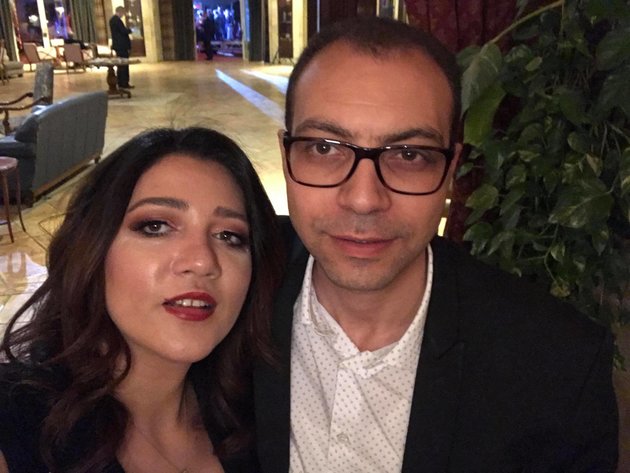
Mohamed Lotfy (right) with his wife, the imprisoned activist Amal Fathy
Mohamed Lotfy, executive director of the Egyptian Commission for Rights and Freedoms, the organisation that won the 2018 Index on Censorship Freedom of Expression Award for Campaigning, has been awarded the Franco-German Prize for Human Rights and the Rule of Law, which is given each year to those who have made outstanding contributions to the protection and promotion of human rights and the rule of law.
“Index on Censorship is very happy to see Mohamed Lotfy’s outstanding work recognised in this way,” said Perla Hinojosa, fellowships and advocacy officer at Index. “We hope this award will help in highlighting injustices occurring in Egypt and the important and much-needed work ECRF does in defending and protecting human rights.”
The announcement was made by Jean-Yves Le Drian, the French minister of Europe and Foreign Affairs, and his German counterpart, Heiko Maas, on 21 November. Lotfy is one of 15 human rights defenders who will receive the award. The official ceremony will be on Human Rights Day on 10 December 2018.
The news comes one day after Lofty marked his four-year wedding anniversary with his wife Amal Fathy, who has been detained since May after posting a video criticising sexual harassment in Egypt.[/vc_column_text][/vc_column][/vc_row][vc_row][vc_column][vc_basic_grid post_type=”post” max_items=”4″ element_width=”6″ grid_id=”vc_gid:1554195663833-6f93bcae-39d6-8″ taxonomies=”24136″][/vc_column][/vc_row]
21 Nov 2018 | Academic Freedom, News and features
[vc_row][vc_column][vc_column_text]
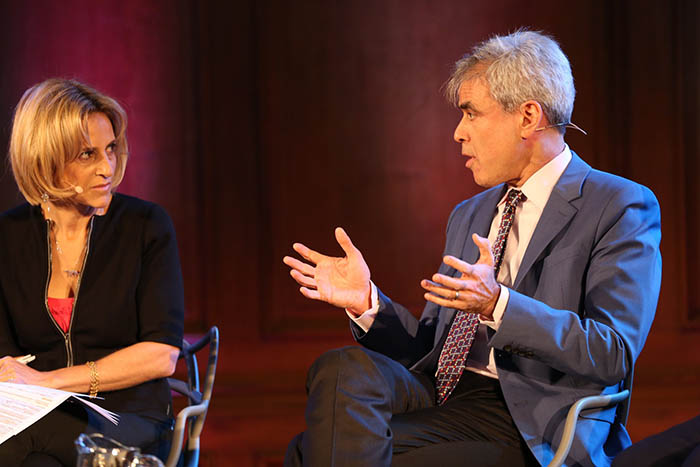
Emily Maitlis and Jonathan Haidt at The Battle Over Free Speech. Credit: Intelligence Squared / Leon Foggitt
“We’re all caught in a minefield,” Jonathan Haidt, a professor of moral psychology, said at an Intelligence Squared panel discussion on education and academic freedom, at the Emmanuel Centre in London on 19 November. “We’re all walking through a world in which one word we say can mean misreported — or partly reported — on Twitter and it blows up into something.”
Also speaking at Battle over free speech: Are trigger warnings, safe spaces and no-platforming harming young minds? were Rabbi Lord Sacks, who was Chief Rabbi of the United Hebrew Congregations of the Commonwealth between 1991 and 2013, Kehinde Andrews, writer and associate professor in sociology at Birmingham City University, and Eleanor Penny, writer, activist and journalist. The event was chaired by Emily Maitlis, presenter of BBC Newsnight.
Most students in the USA and UK want to learn and aren’t triggered by words or ideas, said Haidt, who recently co-authored The Coddling of the American Mind: How Good Intentions and Bad Ideas Are Setting Up a Generation for Failure, with Greg Lukianoff, CEO of the Foundation for Individual Rights in Education. So why then are so many academics working in fear of being reported for insensitivity and when did this phenomenon begin?
“It begins with kids born in 1995,” Haidt explained, referring to what he calls “GenZ” or the “iGen”. In 2013, when at around age 18 the first wave of this cohort made their way to college campuses, terms like “safe space” and “trigger warning” weren’t widely discussed, he said. By 2014, this had changed. “Students were asking for protection from words, books, speakers and ideas — they were treating them as if they were dangerous.”
Difficult and controversial books have always received protest and censure, but the idea that a student could be traumatised or harmed by exposure to them was new, Haidt added.
In the book, this increasingly overcautious approach to education is referred to as “safetyism” — the worship of safety and the perception of the world as being extremely dangerous.
Haidt cited the “mental health crisis for boys and a mental health catastrophe for girls” arising in part from the proliferation of social media, which is much harder on women and men, as a major reason for these changes. “Rates of anxiety and depression, which were fairly stable from the early 2000s to 2010, began rising very sharply,” he added. “For boys, rates of major depression are up about 30%. For girls, they’re up about 40%.”
Rather than “emotional safety”, students now talk about “emotional discomfort”. “Socrates revelled in creating emotional discomfort along the way to learning,” Haidt said. “Many of us are reluctant to do that now, because if I create emotional discomfort in my students, they might take that to mean they are unsafe and there’s a number to call to report me if they think I’ve made them unsafe.”
Haidt said professors no longer trust their students, and that even he has now changed the way he teaches. “I used to be a provocative teacher, but I don’t provoke anymore. I don’t tell jokes, I don’t show them videos.”
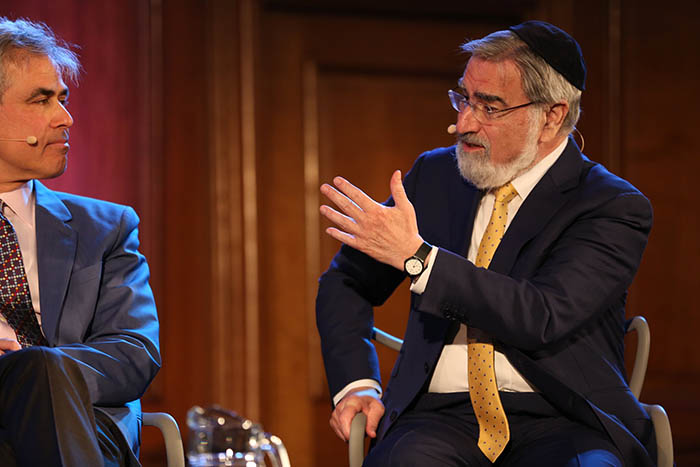
Jonathan Haidt and Rabbi Lord Sacks at The Battle Over Free Speech. Credit: Intelligence Squared / Leon Foggitt
Speaking of the importance of upholding academic freedom, Sacks said: “Society is a symphony score for many voices, and that, to me, is the beauty of the university, and why they’ve become so important while we are disaggregating our societies into non-communicating sects of the like-minded. … All the cries of pain that come from excluding marginalised groups have to be heard, but they have to be heard by all of us.”
Sacks added that he supports free speech because only through a “democratic conversation can we arrive at a society where we can all feel we have a share”.
“That to me is the voice of the university, and why I’m so bothered that the university has gone the way of the rest of society,” he said. “It ought to be a safe space in which we are willing to give a respect for hearing view opposed to our own, knowing that our own views will be given a respectful hearing despite the fact that many of those doing the hearing don’t agree with a word I say.”
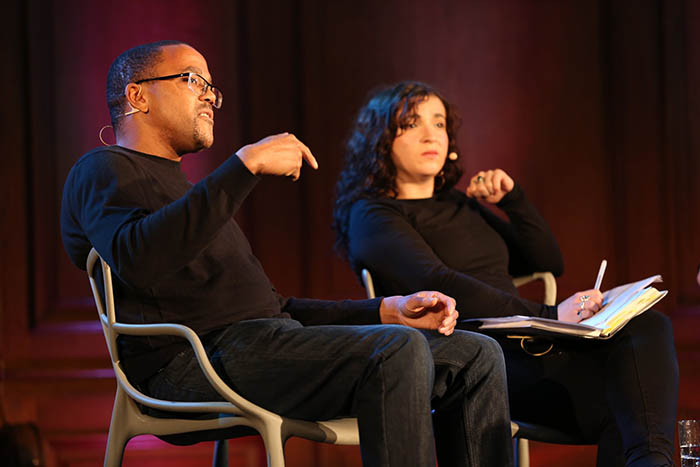
Kehinde Andrews and Eleanor Penny at The Battle Over Free Speech. Credit: Intelligence Squared / Leon Foggitt
For Andrews, “this is the fantasy version of the university, where it’s an institution is built on equality and reason”. He said the irony is that this is a conversation about fragility, but it is the “fragility of the white elite”.
He explained that in 1965, the only group attending UK universities were rich white men. In the half-century since, the institutions have opened up to women, minorities and the LGBT community. “Not surprisingly, these [groups] are who are saying that the universities are powerful, that it’s the universities we need protecting from,” he added. “These institutions, which not too long ago were deciding that I wasn’t a human being, have the same curriculum based on knowledge that says I am not a human being.”
“And then we are somehow surprised when people say we need a safe space,” Andrews said. “And I’m supposed to feel sorry for you because you have to change how you work.”
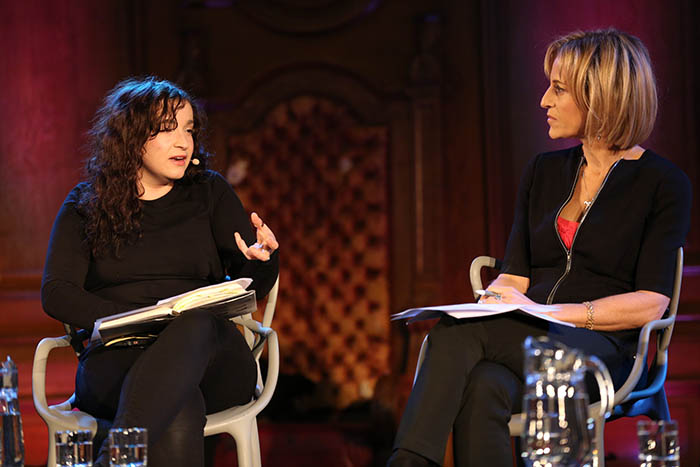
Eleanor Penny and Emily Maitlis at The Battle Over Free Speech. Credit: Intelligence Squared / Leon Foggitt
Speaking about the Oxford Union hosting Donald Trump’s former adviser Steve Bannon on 16 November, which saw more than 100 Oxford University and Oxford Brookes students protest in opposition to the invitation, Penny said: “What we need to understand is that the university as a cultural institution also conveys a stamp of approval, and that’s a stamp of approval that I don’t want to see given to someone who has no interest in protecting free speech.”
Penny added that Bannon’s politics “pose an existential threat to me and people like me”.
“Free speech is fundamentally important because words have an impact,” she said. “To say that we shouldn’t consider the impact of those words in a limited number of cases, such as fascism, is ludicrous, but I think is an under-analysis of free speech.”[/vc_column_text][/vc_column][/vc_row][vc_row][vc_column][vc_basic_grid post_type=”post” max_items=”4″ element_width=”6″ grid_id=”vc_gid:1543941128681-677eb589-8261-7″ taxonomies=”8843″][/vc_column][/vc_row]







